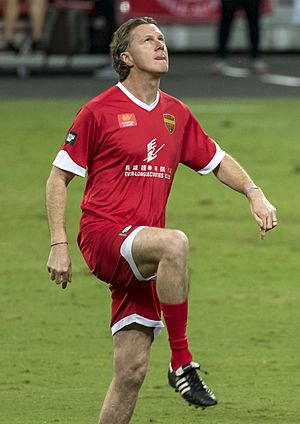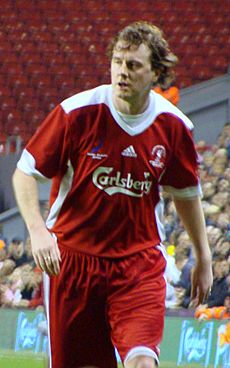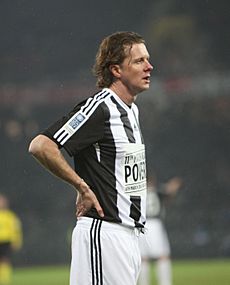Steve McManaman facts for kids

McManaman in a 2017 charity match
|
|||
| Personal information | |||
|---|---|---|---|
| Full name | Steven McManaman | ||
| Date of birth | 11 February 1972 | ||
| Place of birth | Bootle, Lancashire, England | ||
| Height | 6 ft 0 in (1.83 m) | ||
| Position(s) | Winger | ||
| Youth career | |||
| 1988–1990 | Liverpool | ||
| Senior career* | |||
| Years | Team | Apps | (Gls) |
| 1990–1999 | Liverpool | 272 | (46) |
| 1999–2003 | Real Madrid | 94 | (8) |
| 2003–2005 | Manchester City | 35 | (0) |
| Total | 401 | (54) | |
| International career | |||
| 1991 | England U19 | 2 | (0) |
| 1990–1993 | England U21 | 7 | (1) |
| 1994–2001 | England | 37 | (3) |
| *Club domestic league appearances and goals | |||
Steven McManaman (born 11 February 1972) is an English former professional footballer. He played as a winger, a fast player who runs up and down the sides of the field. He is known as one of the most successful English players to have played for a team outside of England.
McManaman spent nine years at Liverpool, where he won the FA Cup and the League Cup. He was famous for his amazing dribbling skills and for setting up goals for his teammates. In 1999, he moved to the Spanish club Real Madrid. This was a major move because he was one of the first top players to switch clubs for free after his contract ended, thanks to a rule called the Bosman ruling.
With Real Madrid, he won the Spanish league, La Liga, and the UEFA Champions League twice. He was the first English player to win the Champions League with a non-English club. After four successful years in Spain, he played for Manchester City for two seasons before retiring in 2005.
Since retiring, McManaman has worked as a football expert and co-commentator for TV channels like ESPN and TNT Sports.
Contents
Early life
Steven McManaman was born in Bootle, England. As a child, he was a fan of Everton. When he was a teenager, both Everton and their rivals, Liverpool, wanted to sign him. McManaman chose to join Liverpool's youth program in 1988 when he was 16.
At Liverpool, he was mentored by the famous player John Barnes. Many people thought McManaman would one day be as good as Barnes. He was also a natural athlete and had been a cross-country running champion in school.
Club career
Liverpool
1990–1995: Becoming a Star
McManaman signed his first professional contract with Liverpool in 1990. He made his first appearance for the team on 15 December 1990. By the next season, he was a regular player. He played 51 games and scored his first goal against Manchester City.
In 1992, McManaman helped Liverpool win the FA Cup. In the final against Sunderland, he was named the "man of the match" for his brilliant performance. He was the youngest player on the field but played a key role in the 2–0 victory.
By the 1994–95 season, new manager Roy Evans gave McManaman a "free role." This meant he could run and dribble all over the field, confusing defenders. That year, he led Liverpool to win the League Cup. He scored two goals in the final against Bolton Wanderers. The game was so dominated by his performance that fans called it "The McManaman Final." The legendary winger Sir Stanley Matthews praised him, saying, "He reminds me of me when I was playing."
1995–1999: Final Years at Liverpool
From 1995 to 1997, McManaman was one of the best players in England. He was known for creating many goals for his teammates. Other teams' managers would often assign a player just to follow him around the pitch to try and stop him.
In 1997, McManaman and Liverpool had trouble agreeing on a new contract. Barcelona, a top Spanish club, offered to buy him for £12 million, but the deal fell through. McManaman announced he wanted to play in another country.
In January 1999, he agreed to join Real Madrid at the end of the season. He still had five months left to play for Liverpool. In his final game at Liverpool's home stadium, Anfield, he helped set up a goal and received a standing ovation from the fans.
Real Madrid
1999–2001: Champions League Glory

McManaman joined Real Madrid in July 1999. He quickly became popular with the fans, scoring in his first home game. He formed a great partnership in the midfield with Fernando Redondo.
His best moment came in the 2000 Champions League Final against Valencia. McManaman scored a spectacular volley goal in a 3–0 win. His amazing performance helped Real Madrid win their eighth European Cup. He became the first English player to win this trophy with a foreign club.
The next season, a new club president arrived and wanted to sell some players, including McManaman. He refused to leave and was determined to fight for his place. The fans and his teammates supported him. He eventually won back his spot and helped Real Madrid win the La Liga title in 2001.
2001–2003: More Trophies and Leaving Madrid
McManaman continued to be a valuable player for Real Madrid. He was known as "everyone's best partner on the pitch" because he helped the team's superstars, like Zinedine Zidane and Luís Figo, play better.
In 2002, he scored a crucial goal against Barcelona in the Champions League semi-final. This helped Real Madrid reach the final, where they beat Bayer Leverkusen 2–1. McManaman won his second Champions League medal.
In his final season, he won a second La Liga title. However, with the arrival of David Beckham in 2003, McManaman decided it was time to leave. He left the club as a fan favorite, having won eight trophies in four years.
Manchester City
In August 2003, McManaman returned to England to play for Manchester City. He joined his former Liverpool teammate Robbie Fowler. He started well, but injuries began to affect his performance.
He played for City for two seasons but struggled to find the amazing form he had at Liverpool and Real Madrid. He was released by the club in May 2005 and decided to retire from playing football.
International career
McManaman played for the England 37 times and scored three goals. His first major tournament was UEFA Euro 1996, which was held in England. He was one of the stars of the tournament. The famous Brazilian player Pelé called him the best player at Euro 1996. McManaman's dribbling skills helped England reach the semi-finals.
He also played in the 1998 FIFA World Cup, but he only made one short appearance as a substitute.
When Kevin Keegan became the England manager, he made McManaman a key player again. At UEFA Euro 2000, McManaman scored a goal against Portugal in the opening game. Unfortunately, he got injured in that match and missed the rest of the tournament.
His last appearance for England was in 2001. He was not selected for the 2002 FIFA World Cup squad, a decision that surprised many, including his Real Madrid teammate Zinedine Zidane.
Player profile
McManaman was a versatile and technically gifted player. He was best known for his incredible dribbling, speed, and ability to create goals for others. While he didn't score a lot of goals himself, the ones he did score were often spectacular.
At Liverpool, he was the creative heart of the team. Teammates like Robbie Fowler and Michael Owen scored many goals thanks to his assists. At Real Madrid, he adapted his style to support the other star players, becoming a reliable and hard-working team player.
Post-playing career
After retiring, McManaman became a media pundit and co-commentator. He has worked for ESPN, Setanta Sports, and BT Sport, providing analysis on the Premier League and Champions League.
He has also taken up a coaching role at Liverpool's youth academy, helping to develop young players. He often plays in charity matches with other football legends. In 2018, he was named an official ambassador for Spain's La Liga.
Personal life
McManaman married his longtime girlfriend, Victoria Edwards, in 2002. They have three children: two daughters, Ella and Lara, and a son, Lucas. The family splits their time between homes in Spain and England.
Together with his friend and former teammate Robbie Fowler, McManaman has invested in racehorses.
Honours
Liverpool
- FA Cup: 1991–92
- Football League Cup: 1994–95
Real Madrid
- La Liga: 2000–01, 2002–03
- Supercopa de España: 2001
- UEFA Champions League: 1999–2000, 2001–02
- UEFA Super Cup: 2002
Individual
- Alan Hardaker Trophy: 1995
- PFA Team of the Year: 1996–97 Premier League
- UEFA European Championship Team of the Tournament: 1996
- Premier League Player of the Month: December 1997
See also
 In Spanish: Steve McManaman para niños
In Spanish: Steve McManaman para niños
 | John T. Biggers |
 | Thomas Blackshear |
 | Mark Bradford |
 | Beverly Buchanan |


